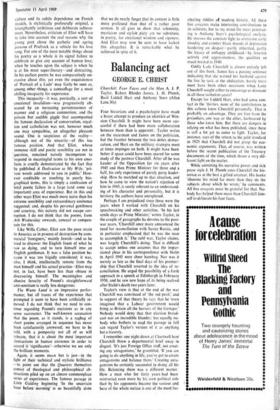Balancing act
GEORGE E. CHRIST
Churchill: Four Faces and the Man A. J. P. Taylor, Robert Rhodes James, J. H. Plumb, Basil Liddell Hart and Anthony Storr (Allen Lane 30s) • Four historians and a psychologist have made a brave attempt to produce an identikit of Win- ston Churchill. It might have been more suc- cessful if there had been more collaboration between them than is apparent: Taylor writes on the statesman and James on the politician, but the frontier between the two defies demar- cation, and Hart on the military strategist must at times impinges on both. It might have been better if space could have been spared for some study of the postwar Churchill. After all he was Leader of the Opposition for six years after 1945 and then Prime Minister for three and a half, his only experience of purely party leader- ship. How he matched up to that situation, and how he came to view the nation's rejection of him in 1945, is surely relevant to an understand- ing of his character and personality, but it is territory the authors leave unexplored.
Perhaps I am prejudiced since these were the years when 1 worked with Churchill on his speechmaking and other activities. 'In his last senile days as Prime Minister,' writes Taylor, in the couple of paragraphs he devotes to the post- war years, 'Churchill once more announced the need for reconciliation with Soviet Russia, and in particular emphasised that he was the man to accomplish it' The cold war, Taylor claims, was largely Churchill's doing. That is difficult to accept unless one assumes that the impas- sioned pleas in his correspondence with Stalin in April 1945 were sheer humbug. Nor was it merely as late as the final days of his premier- ship that Churchill reverted to the idea of re- conciliation. He urged the possibility of a fresh approach in a speech at Edinburgh in February 1950, and he saw new hope of its being realised after Stalin's death two years later.
Taylor's view is that at the end of the war Churchill was convinced of 'the red peril,' and in support of that theory he says that he 'even imagined that a Labour government would bring to Britain all the horrors of the Gestapo.' Nobody would deny that that election broad- cast was an incredible blunder; but equally no- body who bothers to read• the passage in full can regard Taylor's version of it as anything but a travesty.
1 remember one night down at Chartwell howf Churchill threw a departmental brief away in disgust. 'It's just Foreign Office stuff, not creat- ing any antagonisms,' he grumbled. 'If you are going to do anything in life, you've got to create antagonisms and balance them.' Creating anta- gonisms-be certainly succeeded in doing all his life. Balancing them was a different matter.
How a man who for forty years had been mistrusted even more by his own political side than by his opponents became the saviour and hero of the whole nation is one of the most fas- cinating riddles of modern history. All these five essayists make interesting contributions to its solution; but to my mind the most penetrat- ing is Anthony Storrs psychological analysis. He stresses the constant fight to overcome early timidity and counter black moods of depression bordering on despair—partly inherited, partly the legacy of unhappy childhood—by feverish activity and aggressiveness, the qualities so much needed in 1940.
Oddly Lady Churchill is almost entirely left out of this book. James has a passing sentence indicating that she warned her husband against the line he took at the abdication. Surely there must have been other occasions when Lady Churchill sought either to encourage or dissuade in all those turbulent years?
Except for Liddell Hart, who had sonic con- tact in the Thirties, none of the contributors to this volume knew Churchill personally. That is probably an advantage. They are free from the prejudices, one way or the other, harboured by those who knew him. But there are dangers in relying on what has been published, since there is still a lot yet to come to light. Taylor, for instance, says of the return to the gold standard in 1925 that Churchill did not grasp the eco- nomic arguments. That, of course, was written before the recent publication of the Treasury documents of the time, which throw a very dif- ferent light on the matter.
While admitting his narrative power and rich prose style J. H. Plumb rates Churchill the his- torian as at the best a gifted amateur. His books 'illumine his mind far more than they do the subjects about which he wrote,' he comments. All five essayists must be grateful for that. No- body has helped them more than Churchill him- self to delineate his four faces.


































 Previous page
Previous page